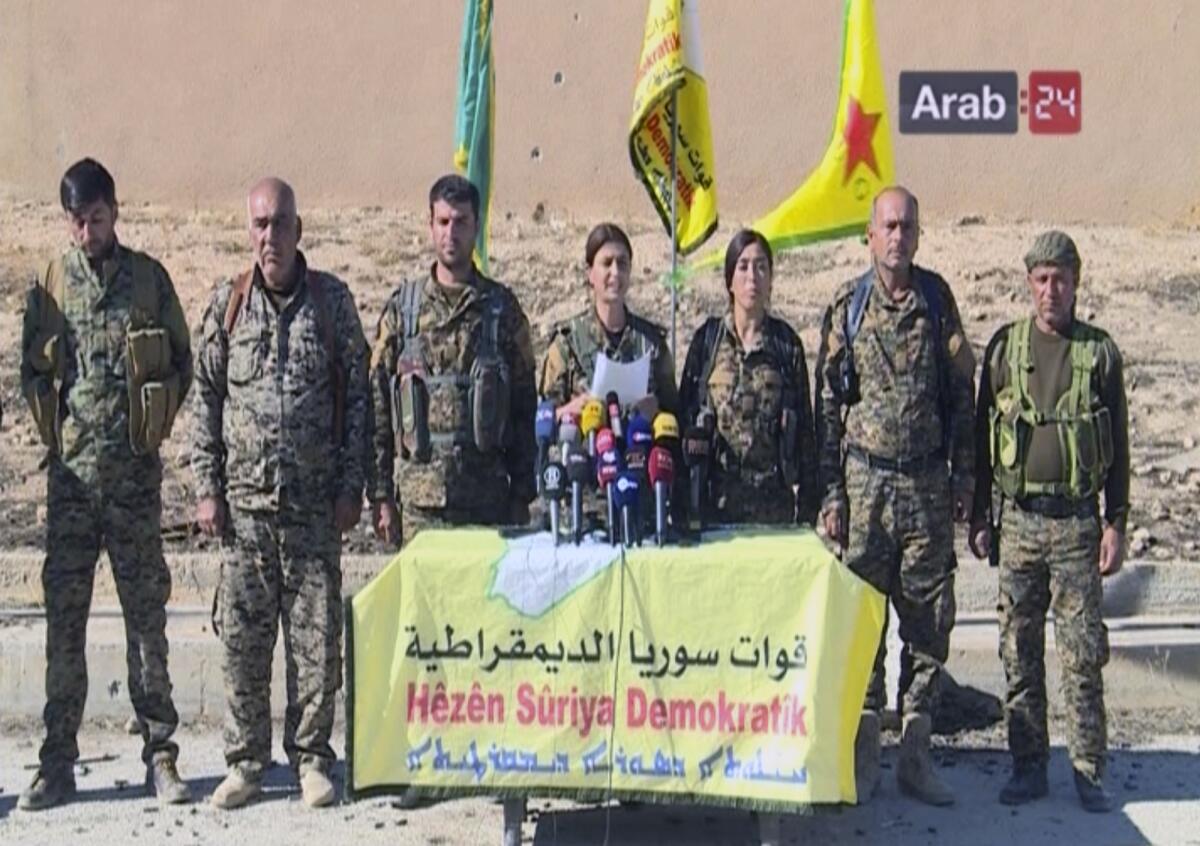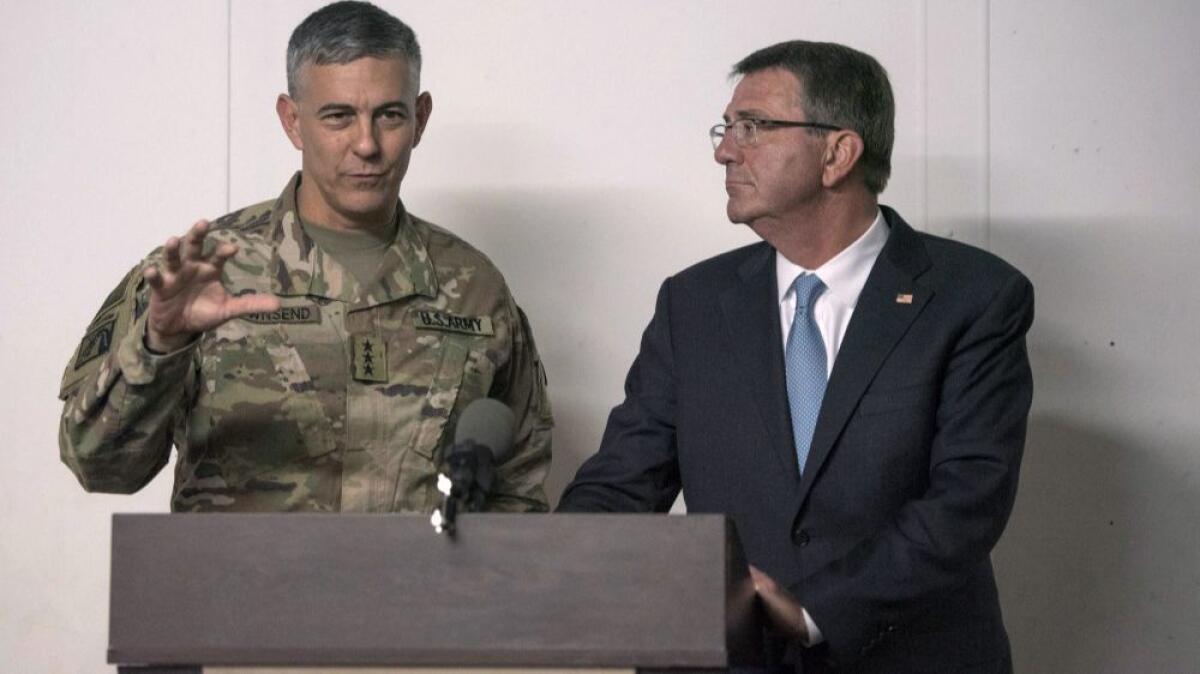Islamic State is under double-barrel siege in Mosul and now in Raqqa

- Share via
Reporting from Damascus, Syria — In 2014, when Islamic State routed its onetime rebel allies from Raqqa, the eastern Syrian city that would become its de facto capital, it was the first stage of a blitz that would bust through the border to Iraq and seize the city of Mosul.
The two cities became the nuclei of what the jihadists declared as a caliphate.
But on Sunday, as Iraqi forces continued to advance through Mosul’s neighborhoods, U.S.-backed militias announced an operation to oust Islamic State from Raqqa.
The Syrian Democratic Forces, a loose alliance dominated by Syrian Kurdish militiamen working alongside Arab and Turkmen factions, launched a “large military campaign” to “liberate Raqqa and its countryside from the claws of … Daesh,” said spokeswoman Jihan Sheikh Ahmad, using an Arabic acronym for Islamic State.
At a news conference in the town of Ein Issa, about 30 miles north of Raqqa, she also called upon civilians in Raqqa and its surroundings to stay away from “the gatherings of the enemy,” which would be targets for the “liberating forces.”
Ahmad said the offensive included 30,000 militiamen and would be done in coordination with the U.S.-led coalition.

U.S. Defense Secretary Ashton Carter said Sunday that he welcomed the announcement that the operation to “free Raqqa from ISIL’s barbaric grip has begun.” ISIL is an acronym for Islamic State.
“The international coalition will continue to do what we can to enable local forces in both Iraq and Syria to deliver ISIL the lasting defeat it deserves,” he said.
The U.S. has been the main driving force behind the formation of the Syrian Democratic Forces and has poured weapons and given vital air and logistical support to its main component, the Kurdish militia known as the People’s Protection Units, or YPG.
U.S. special forces units have also embedded with the Kurdish troops, U.S. officials have said.
Army Lt. Gen. Stephen Townsend said last week that U.S. intelligence has detected signs that Islamic State is plotting attacks against the West from Raqqa, adding urgency to the plans to take the city.
Talal Sillo, a spokesman for the Syrian Democratic Forces, told a local news outlet in Ein Issa that the coalition had delivered what he described as high-quality weapons promised to the alliance.
The offensive is sure to irk Turkey, a fickle ally of the U.S. that views the Kurdish-majority militiamen as terrorists. It has offered to work with the U.S. to take Raqqa — but only if the Syrian Democratic Forces are out of the picture.
In August, Ankara launched Euphrates Shield, an operation in which its forces fought alongside Syrian rebels to attack Islamic State positions. Yet it also used those forces to target the city of Manbij, which the Syrian Democratic Forces had captured from Islamic State in August.
U.S. officials last week acknowledged the looming conflict between its two main allies.
“The facts are these. The only force that is capable on any … near-term timeline is ... the Syrian Democratic Forces, of which the YPG are a significant portion,” Townsend, commander of U.S.-led operations against Islamic State, said in a Pentagon news briefing in October.
“So we’re negotiating, we’re planning, we’re having talks with Turkey and we’re going to take this in steps.”
Yet it is unclear how committed the Kurds would be to taking Raqqa. Their ultimate goal is an independent Kurdish state over portions of what are now northern Syria and Iraq. But Raqqa, with a mostly Arab population, was never envisioned as part of that.
Kurdish community members, meanwhile, have expressed their unwillingness to participate in a potentially difficult campaign and spill Kurdish blood without receiving assurances from Washington that their independence will be recognized.
Even if the horse-trading to cobble together a Kurdish-majority force could be achieved, such a scenario would probably spur a reaction from Damascus. In April, Syria launched its own campaign to take Raqqa, though it failed to reach the city and soon retreated in the face of reinforcements by the jihadists.
In a meeting with journalists last week, Syrian Foreign Minister Walid Moallem was unequivocal in his rejection of Turkish troops fighting on Syrian soil.
“They are an occupying power. They are not invited to be there,” Moallem said.
He was equally dismissive of any move toward any secessionist designs by the Kurds.
“If they want to separate, we will fight them,” he said.
MORE WORLD NEWS
Nicaraguan President Daniel Ortega appeared headed to reelection, with his wife as vice president
Fleeing families pour into U.N. camp as Iraqi forces try to push deeper into Mosul
Smiling children, open graves: Scenes from the battle for Mosul
UPDATES:
1:30 p.m.: This article has been updated throughout with staff reporting, Ash Carter statement.
This article was originally posted at 7:40 a.m.
More to Read
Sign up for Essential California
The most important California stories and recommendations in your inbox every morning.
You may occasionally receive promotional content from the Los Angeles Times.











